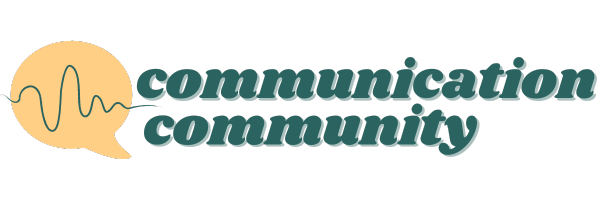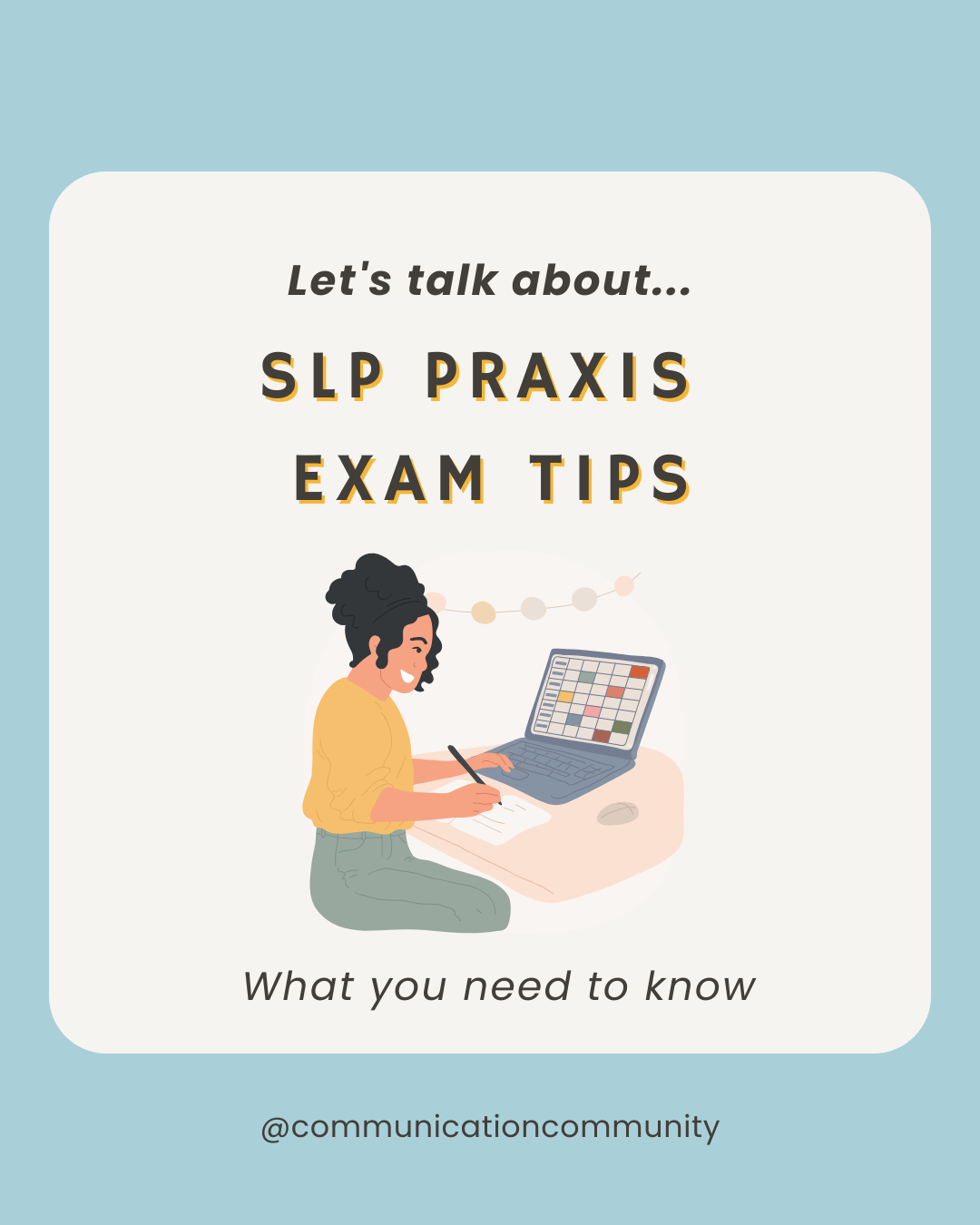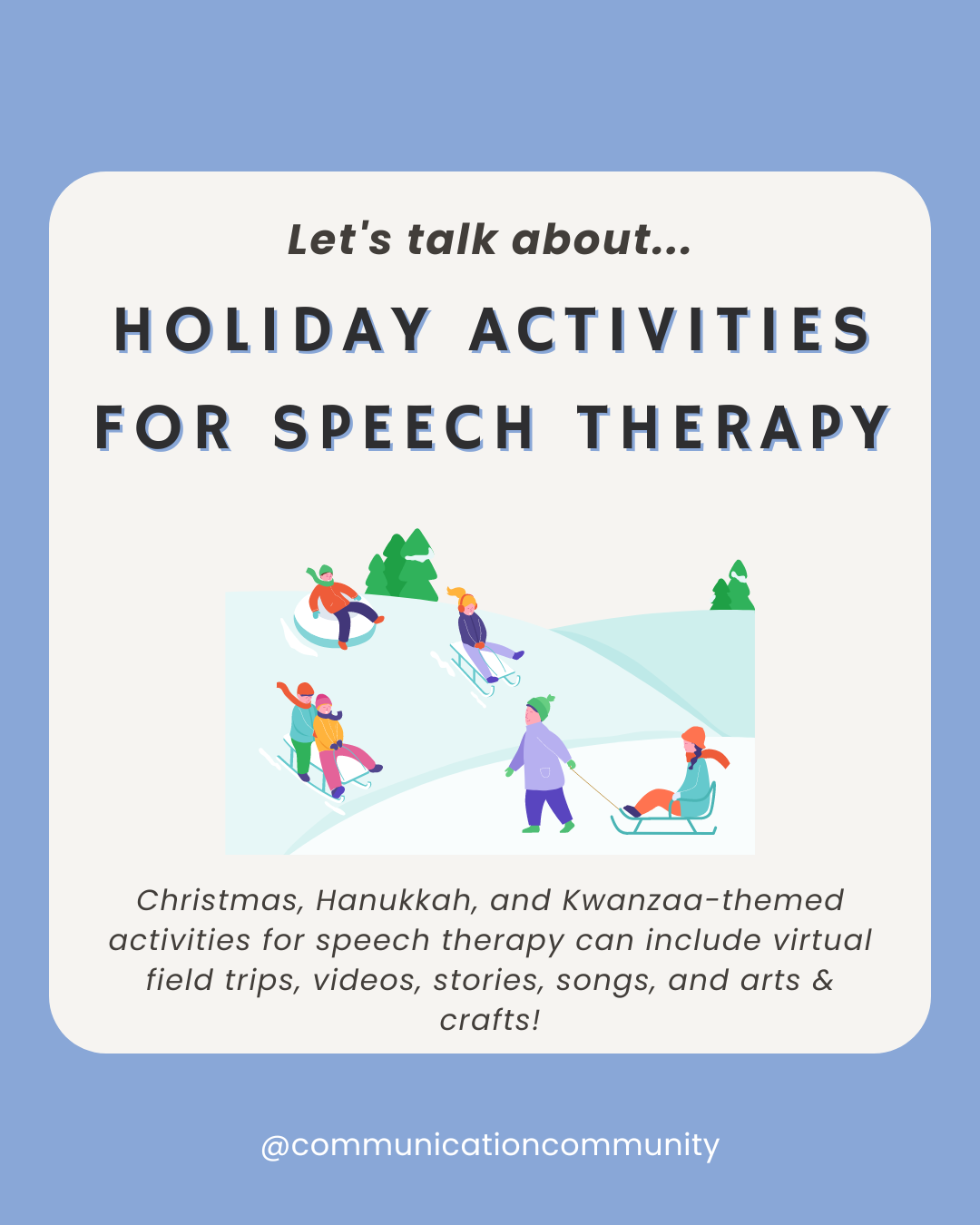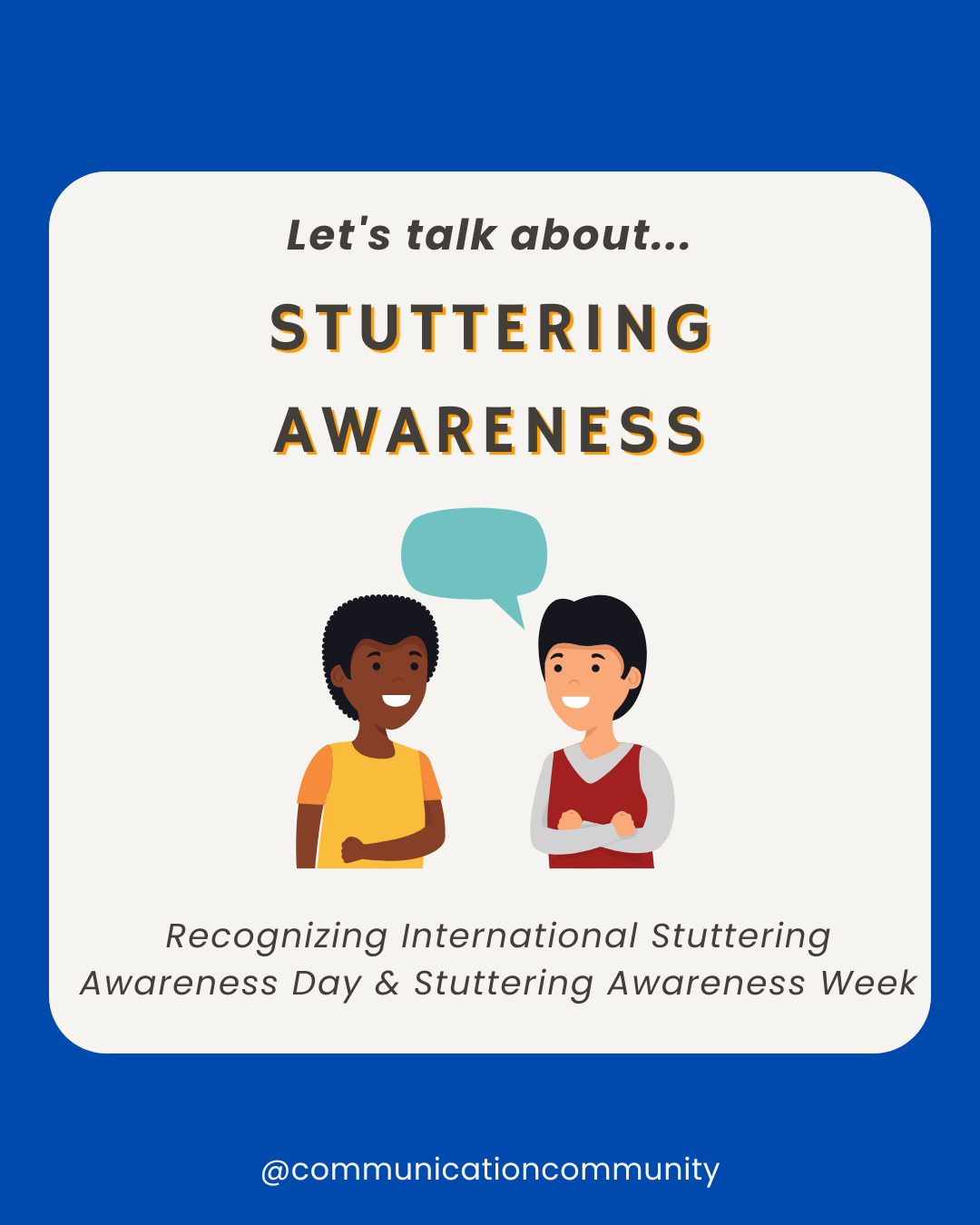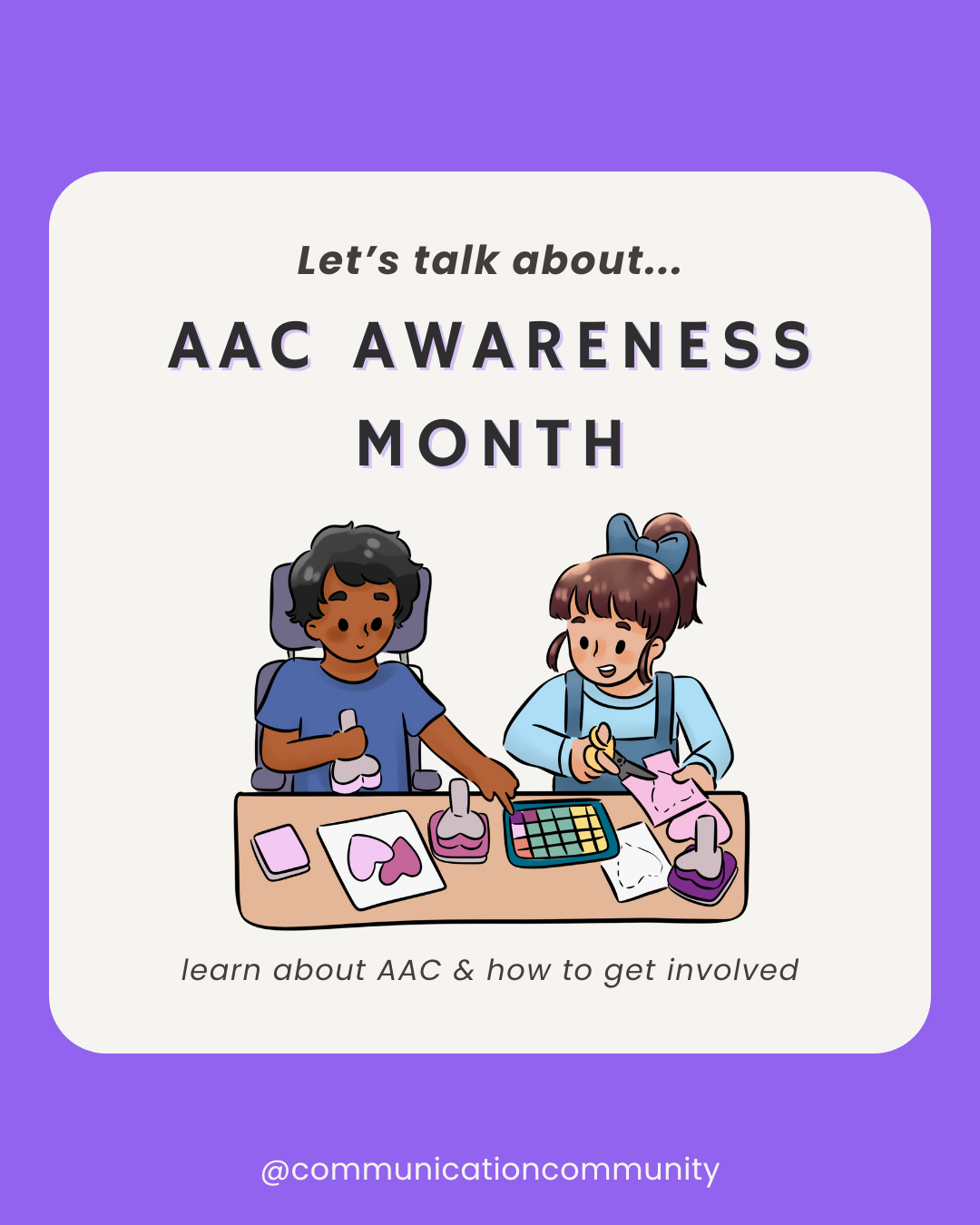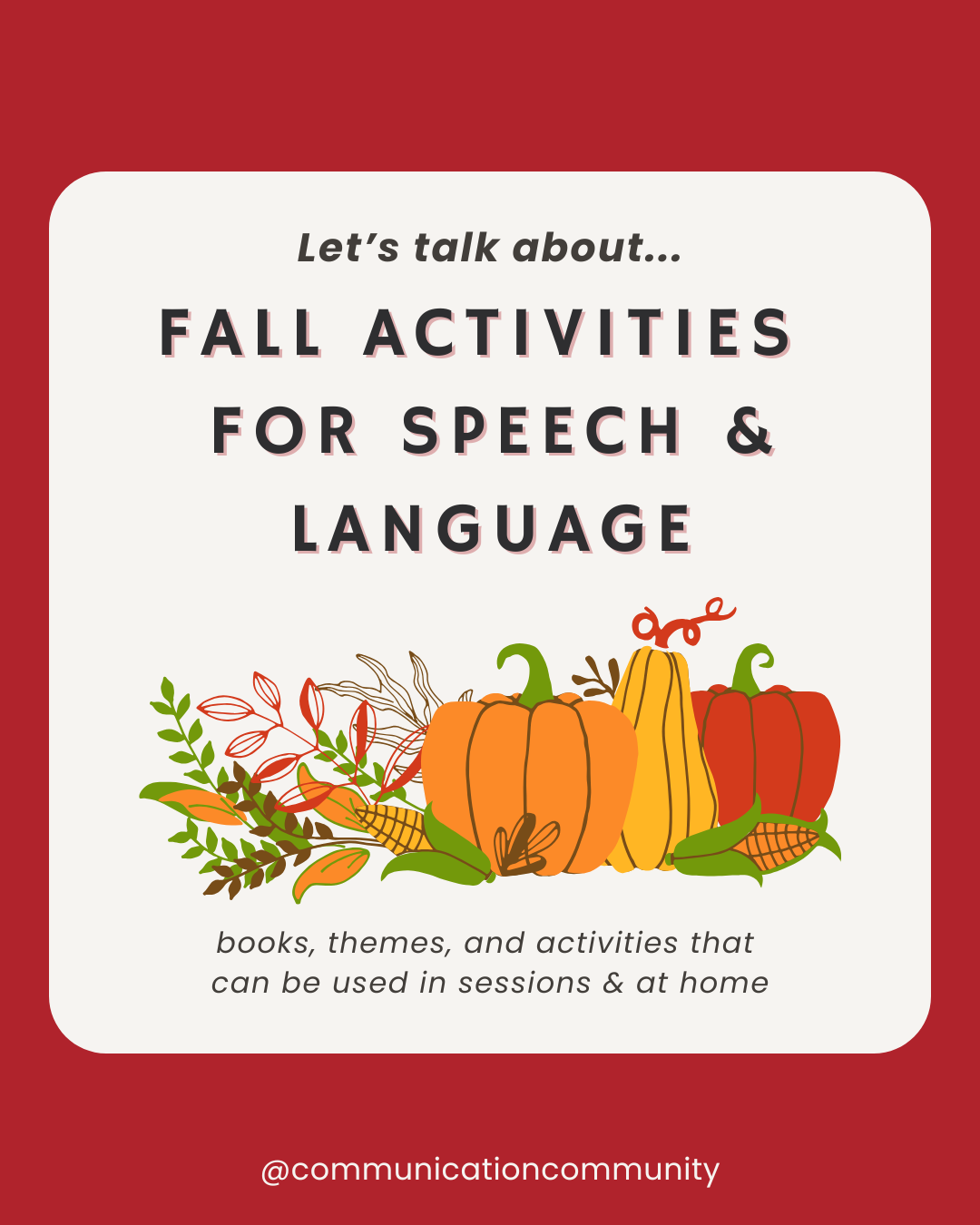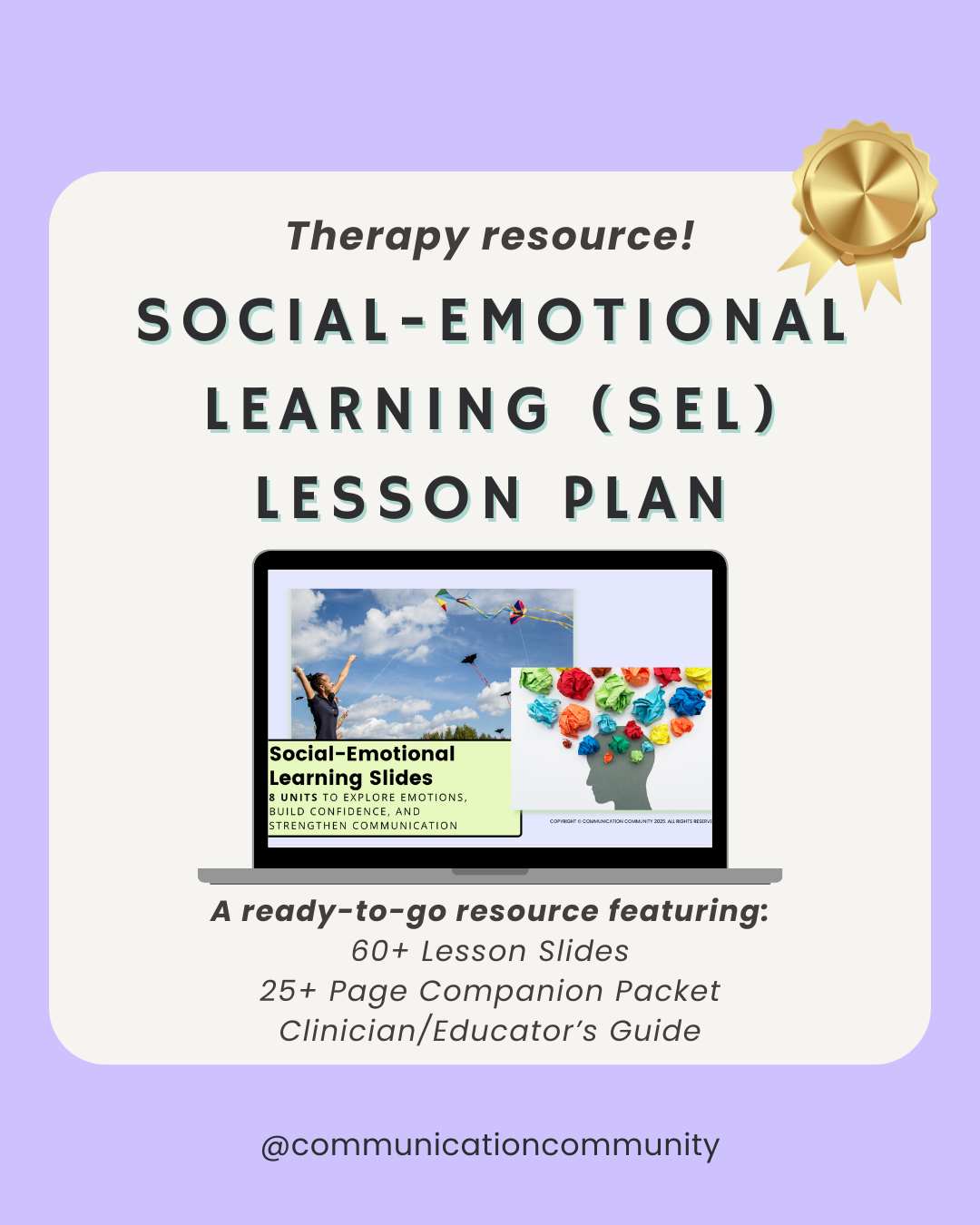Looking for 1:1 guidance to prepare for the SLP Praxis Exam? We offer tutoring services. Learn more here.
What is the SLP Praxis Exam?
The basics: The SLP Praxis exam (code: 5331) is a 132-question, multiple-choice exam that covers the foundational knowledge, assessment, and treatment of all areas related to speech-language pathology. Throughout your graduate program, you probably heard about the “Big 9” areas of study; this test covers all of those areas. Approximately one-third of questions relate to the foundational knowledge of different speech-language areas, one-third relate to the assessment of speech-language disorders, and one-third relate to the treatment of them. Most of the questions are multiple choice, meaning you choose A, B, C, or D, but some of them are multi-select, matching, or sequencing questions.
The time: You have 150 minutes to complete the SLP Praxis exam, which means you have a little over one minute to answer each question. Like other comprehensive exams, some questions are short and simple and might take you less than 30 seconds to answer, while others are longer and more complex and may take you well over 60 seconds to answer. Knowing how much time you have to answer each question is helpful and can help you pace yourself throughout the test.
The score: A passing scaled score is 162. It's important to note that the Praxis website doesn’t specifically indicate how many questions you have to get right in order to pass, though a rough estimation is that you need to answer about 60-70% of the questions correctly to pass. Your scaled score may range from 100-200. After taking the Praxis exam, you may receive a raw score or a preliminary scaled score.
Some questions don’t count towards your score. The questions that don’t count towards your score are considered “pretest” questions that the administration is testing out for future use (how kind of them).
You can expect to receive your official scaled score report a few weeks after you take it - the test administration will tell you when. Your official score report is important to retain because ASHA will request this information for your CCCs. Additionally, some employers might also request it for your first SLP position.
For a full guide on the SLP Praxis and general testing requirements, check out the website and/or Information Bulletin.
When to Take the SLP Praxis Exam
We took the exam when we had finished taking all of our graduate courses but still had practicum hours to finish. Our university required that we pass the exam in order to earn our degree but not all schools require that. Additionally, some states allow you to work under your provisional license and complete your Clinical Fellowship (CF) before passing the exam whereas others require you pass the exam before getting your provisional license.
I am glad I took the exam while I was still in “school” mode, but it’s not necessary. Taking the Praxis before you have finished your graduate coursework gives you more time in the event that you were not successful the first time around, too.
Top 5 Things to Know About the SLP Praxis Exam
- Your score doesn’t determine how “good” of an SLP you will be! SERIOUSLY. Long, arduous, multiple-choice exams don’t translate into the clinical application of speech-language pathology in any setting. If you get a good score, you can definitely be a good SLP, but you can also definitely be a good SLP with any exam score. Historically, I (Becca) am someone who generally does well with standardized exams, which was an advantage for sure, but if you are not someone who does well with standardized exams, you can still pass! Kristi considers herself to be more in the “average range” when taking exams like this and she also did well on the SLP Praxis.
- You can get a lot of questions wrong and still pass the exam! While we don’t know the *exact* number, we can tell you that you don’t need anywhere close to a perfect score to pass. So, if you are bummed out about a question (or series of questions) you were stuck on, as you continue your exam, remember not to sweat it!
- The questions are not trying to trick you! I know that sometimes I overthink questions and wonder if there’s a hidden meaning I’m not getting, but this test isn’t trying to do that. It’s trying to see if you are able to answer questions about speech-language pathology. This is not to say there aren’t going to be *tricky* questions, but I find it helpful to remind myself that there aren’t supposed to be *trick* questions.
- Preparing is necessary! It can be tempting to skip studying as you juggle all of your other school/work/life responsibilities; however, studying and preparing for the test is definitely advised. There are multiple ways to study, which we will discuss below.
- Passing the test and earning your Certificate of Clinical Competence (“CCCs”) is a great feeling! You have worked so hard for this! Not only does it give you a great sense of accomplishment, but also, you are able to have more employment opportunities since you aren’t required to have a supervisor after your CF is completed.
How to Study for the Praxis Exam
Collect your study materials
We used the Advanced Review SLP Praxis Exam study book for the majority of our studying. You can find it on ASHA or on Amazon. It helped us organize our studying as it breaks different areas down into different chapters. I also supplemented with flashcards and charts that I made for specific areas that I wanted to study more, including the cranial nerves and Brown’s morphemes. The Medical SLPs Praxis Study Guide is also helpful!
I also made voice memos of myself reciting information and listened back to them as I was driving. I was preparing for the exam during a time when I had some long commutes, so listening to my recorded voice memos helped me feel productive during busy days! I am also a big fan of podcasts, so it felt like listening to my own personal podcast.
ASHA’s Practice Portal of Clinical Topics is also a great resource. I find it more helpful to study off-screen, e.g., not on a computer, but you may not feel that way! You can also print off different areas to study. Additionally, the Praxis has free resources (emailed to you) with different areas to study, practice questions, and general test-taking preparation tips.
Make a schedule
I started studying about 12 weeks before the test. I signed up for it at the end of the summer and started studying as the spring semester ended. I wrote down all of the areas I needed to study (mostly using the chapters from the Advanced Review Praxis book) and broke down which weeks I would study each area. I tried to spend 20-30 minutes each day studying with a little more time on the weekends. This wasn’t perfect; sometimes I studied six days a week and sometimes I studied just two days a week. Remember: perfection isn’t attainable. I spent the last week reviewing content that was more difficult for me.
Take a practice test
One of the best ways to prepare for tests is to take practice tests. The Praxis website provides three practice tests, but there are other options online as well. If you’re worried about timing, you can work on a complete practice test and see if you are able to get through it in 150 minutes. This may provide good insight into whether or not you should try to speed up or slow down when taking the actual exam. If you’re not too worried about timing, consider taking practice tests in chunks, answering 10-15 questions a day during your last few weeks of preparation. We should also mention that we did not pass all of our practice tests and did just fine! There are definitely some tests out there that are “tougher” than others.
Collaborate with others
It can be helpful to discuss concepts and information with other students in your cohort! You can each pick a topic, such as “assessment of pediatric language disorders” or “treatment options for dysphagia,” and give a mini-lecture on it. “Teaching” information to others is another highly effective study strategy and it may also help you understand where you have some knowledge gaps or areas to study more.
Use a tutor
If you’re struggling with making time to study, understanding difficult concepts, or knowing how to even approach preparing for the SLP Praxis Exam, using a tutor may be beneficial for you. There are a number of tutoring services available online. We found that SLPs were helpful tutors and served as great mentors as well. Talking to SLPs who had been in our position was definitely comforting and reassuring; this is just a brief hurdle in the path to a successful career!
We offer tutoring services!
If you're interested, send us an email at hello@communicationcommunity.com.
We will work with you to schedule a free consultation, then let you know how to sign up, choose how many sessions you are looking for, and get started on tutoring sessions!
What I Studied to Prepare for the SLP Praxis Exam
Everything.
Just kidding—I did obviously try to review everything, but there were certain topics that I focused on more than others. This was influenced by what I felt I lacked in my clinical hours thus far. For example, I worked with a client who stuttered during one of my clinical placements, so I felt a bit more at ease with my stuttering knowledge. I had a great practicum in a vents/trachs hospital and had a lot of clinical experience with dysphagia, so I didn’t spend as much time reviewing it. Kristi did not have a lot of dysphagia experience before taking the SLP Praxis so she reviewed this content more, both by studying the material and asking questions to those of us who did have the experience.
I did not have a lot of experience with motor speech disorders, voice disorders, or cleft palate, so I spent more time reviewing these topics. I also hadn’t had a placement in a school setting when I took the exam, so I spent more time reviewing child language, articulation, and phonology information.
My Top 10 Areas to Study for the SLP Praxis Exam
As mentioned above, there may be areas where you feel more or less confident. We encourage you to reflect on your skills and identify the specific areas you want to prioritize in your studying. Below are some key areas that frequently appear on the SLP Praxis Exam:
- Professional Issues: ASHA Code of Ethics/applicable laws (e.g., IDEA, FERPA)
- Motor Speech: distinguishing between apraxia and dysarthria; understanding the different types/characteristics of dysarthria
- Adult Language: distinguishing between aphasia and right hemisphere damage; understanding the different types/characteristics of aphasia
- Developmental Milestones: age of acquisition norms for articulation, phonology, and language
- Multilingual Learning: recognizing dialectical and language differences from Standard American English
- Anatomy and Physiology: cranial nerves and muscles related to motor speech and dysphagia
- Research Designs: independent and dependent variables; research methods
- Fluency: distinguishing between stuttering and cluttering; approaches to stuttering treatment
- Dysphagia: instrumental evaluations, treatment options
- Feeding: basics of pediatric feeding and swallowing
What I Didn’t Worry About When Preparing for the SLP Praxis
Having everything memorized. There is no way to hold alllll of the information related to speech-language pathology in your head all at once. There is a reason SLPs often specialize in specific fields!
Questions I didn’t know. There are some questions that you will just not know. Whether it be test-taking anxiety or concepts/terms that simply weren’t covered in your graduate courses, there are going to be questions you don’t know. I vividly remember a question about Van Riper’s Stuttering Modification Therapy, a topic I thought I knew inside and out, without a multiple-choice option that fit what I knew. I was a little frustrated, but I just guessed an answer and moved on.
Passing the SLP Praxis on my first try. Getting your CCCs does not require you to pass the exam on your first try. You can take the test when 28 days have passed since you last took it. While I was able to pass it when I took it initially, it’s not necessary. That helped relieve some of my nerves; best-case scenario was I passed, worst-case scenario I would try again next month. I reminded myself of this over and over (and over) again.
Remember!
If you’re at the point where you’re taking the SLP Praxis exam, remember this: you made it through your undergraduate program, you were accepted into grad school, and you’re done (or almost done) with your graduate program! You have accomplished a lot of difficult things and you can accomplish this as well.
*We may make a small commission if you purchase any materials through Amazon, though all opinions are our own.
